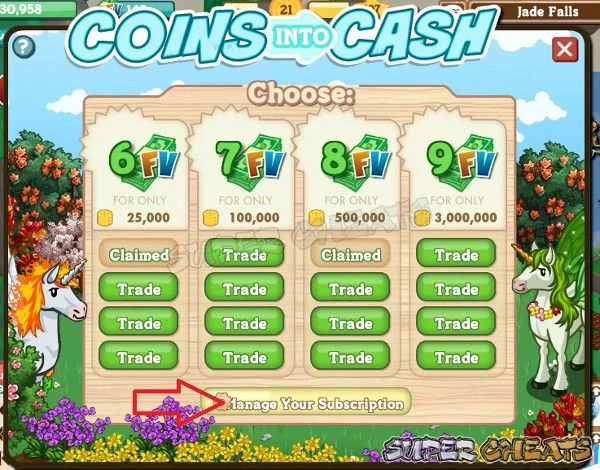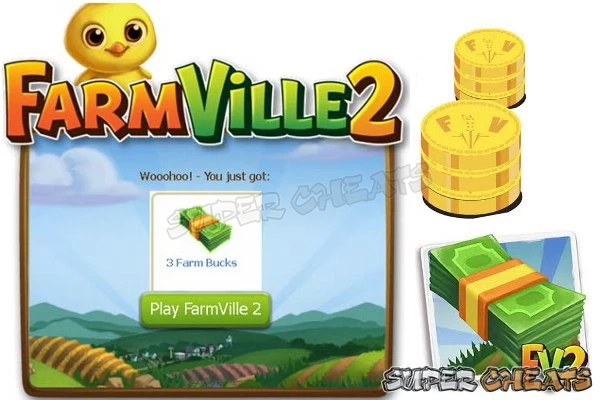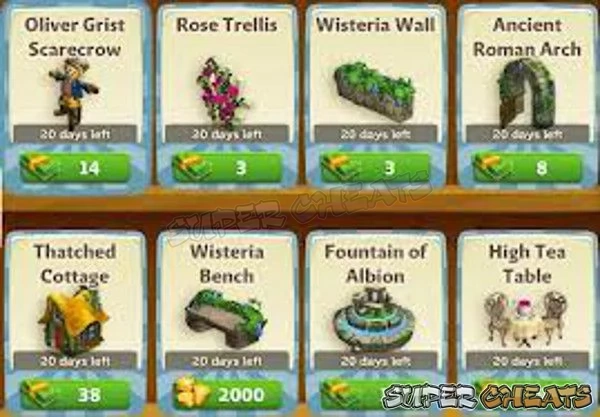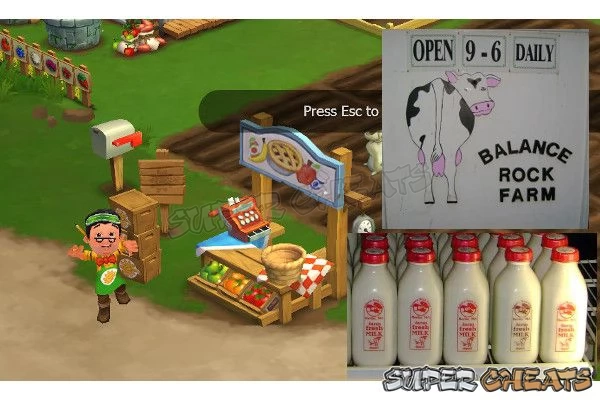The Farmville 2 Economics Overview
Establishing Good Play HabitsPrevious Page
Starting Tips, Tricks, Strategies, and Good Game Play Habits
Considering the major emphasis that has been placed upon the ability for players to exchange real-world money for either time or access in the game, a basic overview of the Farmville Economy is not only advisable, it should be part of the basic information that you apply on an ongoing basis as you play the game. This is true especially when you consider how your game play can be significantly impacted by a willingness to spend real-world money as part of your game play Strategy.
With that in mind, we present you with this basic overview of the Farmville and Farmville 2 economies, which are largely subject to the same basic systems that revolve around the standard Facebook Game Card, which offers players the ability to either add Facebook Credits to their Facebook Account, or skip that stage entirely and add Farm Bucks (or coins) directly to their account.
The Changing Nature of the Farmville “Buck” and Farmville “Coin”
Before we delve into the various economic realities that are currency in Farmville, it is important that we acknowledge that recently a number of websites and online monthly magazines began to write about a new and upcoming game addition for Farmville 2, called the “Farmville 2 Coins-Into-Cash” Service.

This new addition to the game was first brought to our attention by a Tweet from FarmGoddess, one of the admins at the popular Farmville-oriented website Farmville Freak, and was subsequently covered both on the official pages at Farmville Freak, with additional and continuing coverage on other sites, and more detailed coverage of the Beta Program Announcement mainstream games News sites.
While Zynga was slow to provide actual and official confirmation of the new program and its Beta test, they did eventually do so in late 2012, in an announcement that partially reads:
“FarmVille Subscriptions Beta are now live!
“Subscriptions are a beta test of a new feature that we're very excited about. A small number of Farmers have been invited to this beta test for the next several weeks. We plan to observe the test and see if these farmers enjoy the feature or not; as well as identify any issues or other Items we need to address before considering a full release.”
The announcement was made on the official Zynga support website for Farmville and Farmville 2, and included confirmation of the exchange program, the exchange rate of 10,000 coins per $2 Farm Bucks, and covered the basic details of the Beta Program including:
- The ability to “convert millions of coins into Farm Cash every month”
- That the “Full coin amounts become available again next month”
- That “All packages not used within the month do not carry over to the next period” which is a previously unannounced limitation.
- That “Membership is automatically renewed” but the player can cancel at any time without effecting previously completed transactions.
At the time of the official confirmation of the Beta Program additional details were also provided that directly address the exchange process, including its limitation in the form of the menu-based exchange choices in variable exchange rates depending upon the amount being exchanged.
Note the “Beta” Emphasis
Before you get too excited about this new program and feature we should point out and heavily emphasize that the Coin Buck Exchange System has not been widely rolled out and is not fully available at this time.
In fact, based upon the response that we received from our media contact at Zynga we would be remiss if we failed to point out to you that Zynga does not officially or unofficially consider this Beta Trial to be anything more or less than just that: a Beta Test for a feature that the company is considering adding to the game.
Our media contact at Zynga made it a point to stress that the Coins-Into-Cash program is little more than an experiment at this stage, and whether or not it is adopted will largely depend upon how much use it gets from the small community of approved Beta Testers.
Having said that, we should also note that the official confirmation of the details around it as well as the company confirming the details for its basic function and testing stages are a good sign that it will eventually be rolled out world-wide. That should not be all that great a shock to most players, especially when you consider that this particular feature has long been sought by hardcore players, something that Zynga is doubtlessly very much aware.
Facebook and Zynga have confirmed that the capability to exchange Coins for Bucks by the players, at will, and on-demand, will be rolled out as a standard game feature but it will be a standard game feature that is based upon a subscription-based service, and in light of that even the most jaundiced of gamer eye will have to acknowledge that the fact that the company is deploying the program as a pay-for-access approach makes its permanence a virtual certainty.
Players will need to pay a monthly subscription fee of $10 per month to Zynga, and for that fee they will obtain access to the Coin Exchange System, as well as additional special features that are to be announced at a later date. Among these special features available exclusively to players who choose to open a Zynga/Farmville Subscription will be:
- The ability to exchange up to 120 Farmville Bucks in Farmville Coins each month;
- A 20% Discount on in-game store purchases of Animals using Farmville Bucks;
- A 25% Discount on in-game store purchases using Farmville Coins.
The official exchange rate for the Coins – to – Bucks System is set at 10,000 Farmville Coins per $2 Farmville Bucks, and exchanges must be made in increments of $2 Farmville Bucks, without fractions thereof, which means that the minimum exchange event will consist of 10,000 Coins for $2 Bucks, and the maximum exchange event will consist of 600,000 Farmville Coins for $120 Farmville Bucks.

Farmville Bucks and Coins - In-Game Value and Non-Value Currencies
Farmville Bucks are the in-game value currency, which is to say they have actual value in real-world monies, though you cannot obtain real-world money for them, as the transaction is a one-way process. It simply means to obtain them in any significant quantity you will need to purchase a game card or purchase them directly in the game via the “Add Farm Bucks & Coins” Menu System. Farm Coins have no real-world value per se, being the in-game non-value currency that is used to pay the player for Actions, rewards, and etc.
At the time that this guide was created the exchange rates for Farmville Bucks was set at the following rates based upon volume in exchange.
Standard Exchange Rates for Small Volume Trading
- $1 Farm Buck = 2.5 Facebook Credits
- $1 Farm Buck = .20 cents US
- $1 Farm Buck = .20 cents EU
Most Favorable Exchange Rates for Large Volume Trading
- $1 Farm Buck = 1.7 Facebook Credits
- $1 Farm Buck = .15 cents US
- $1 Farm Buck = .15 cents EU
The above rates have been widely rolled out throughout the rest of the world, and at the time that this went to press the Gamecard Program for the purchase of Farmville Game Bucks has officially been confirmed to include the following countries/sources:
- Australia
- Bahrain
- Brazil
- Canada
- France
- Finland
- Germany
- Hong Kong
- India
- Indonesia
- Ireland
- Italy
- Jordan
- Macau
- Malaysia
- Mexico
- Netherlands
- New Zealand
- Norway
- Philippines
- Saudi Arabia
- Singapore
- Spain
- Sweden
- Taiwan
- Thailand
- Turkey
- United Kingdom
- United States
Understanding the Significance of the New Exchange
In a nutshell adding in the capability for gamers to exchange their surplus coins for FV Bucks in the game is nothing short of a game-changer... Or it would be if the players were swimming in FV Coins, but the thing is they are not. The reason for that is really quite simple: Farmville 2 is just too new for their to be a surplus of anything, let alone Coins.
If you look at the original Farmville it makes sense that there would be a surplus of Coins in the game, because most of the serious gamers have multiple fully-expanded and fully developed farms that are pulling in way more Coin than the player can possibly spend, largely because they already own the big-ticket Coin Items at this late stage in the game, whereas the exact opposite is true for Farmville 2. That is not to say that some players may have already attained a position in which they are pulling down a reliable income of FVC, but it is unlikely that a large enough percentage of players are doing so to the point that their exchange efforts will do anything more than create a tiny blip on the transaction radar.
That is OK though, because in considering this new program we are not thinking in the here-and-now, but rather in the long-term glimpses of tomorrow and a whole deck of tomorrows, a year or even two down the road when the average gamer and FV2 fan will then be in a position to really make use of that exchange system, at which point it will be a valued and well-used feature in the game.
Why?
The simple answer is that the vast majority of the truly desirable content in the game, and particularly the optional content, special animals, and “bling-type” decoration Items are now and pretty much always have been purchased using FVB, and not FVC. So you can take it as a given that when the majority of the community is finally in a position at which they can truly make use of it, they will.
That nicely wraps up the matter of the FVCoins-Into-FVBucks Exchange System and as a bonus its existence allowed us to open this section on the Farmville 2 Economy on a subject that will certainly be of interest to a wide cross-section of players. Sadly the direction we are now forced to head in is a bit dry and involves, well, the Farmville 2 Economy...

Just the Basic Facts
The first and probably the most important point that needs to be made and especially if you played the original Farmville is this: Farmville 2 is NOT Famville.
The Basic Economics model under which Farmville functioned was largely a crop-based AgriBiz model whose focus was the rapid turnover of high-value crops in large quantities. In addition to the crops, the players also made coin (as well as XP and Crafting kit) breeding and raising farm animals in very large quantities. The secret to success and the backbone of the economy in Farmville was the very large farms. And when I say that I mean FARMS plural, not singular.
The economic strengths for the game had a lot to do with its well-evolved foundation which consisted of the base farm and its half-dozen satellite farms which the truly successful player made it a point to expand as quickly and as large as they could manage.
In addition to the crops and animals the game included a fairly well developed Crafting system and a very robust and highly profitable tree-based orchard sub-economy that allowed clever farmers what amounted to a license to print money in the game or nearly so, plus there is a quest and mission system in the original Farmville, though to be fair it is very rudimentary and weak when it is compared to the implementation of the quest and mission system in Farmville 2...
Still when you add all of those elements together the basic foundations of the economy in the original Farmville is both easy to understand and made success in the game easily obtained even at the hands (and with the account) of a truly average and casual player!
The thing you need to quickly and fully grasp is that none of that applies to Farmville 2.
Things are Tough All Over
While the foundations for the economy in Farmville 2 share some similar aspects to that of Farmville, a solid knowledge of how things worked in the original game will get the player absolutely nowhere in the new game, and not only that, any attempt at utilizing the economic models and Tricks from Farmville is certain to doom the player in Farmville 2 to abject failure.
At least part of the reason for that has to do with the new approach that the developers took in creating the game. Believe it or not the game interface, PoV and the character that the player takes on in the game have a lot more to do with this than may be apparent on the face of it. At the risk of losing momentum I want to explain that.
With the new Farmville a serious attempt has been made at forging a solid connection between the player and their in-game character, but to do that certain sacrifices had to be made, among them the simplicity of the interface in favor of a more involved one that gives the player a sense of self and a sense of community.
While having mates (friends for you Yanks) in the game and a solid and dependable core group of neighbors who can be counted upon to assist you in your various build projects and help you to complete the many quests and missions that the game is virtually loaded with, the secret to success in Farmville 2 is the simple act of thinking.
In many ways that nicely explains the new economy here as well, and we should emphasize that aspect heavily, because while Farmville 2 genuinely is an Agribusiness simulation, its roots and the path to success firmly fall upon a path that closely resembles that of the modern-day real-world small-scale family farm.
A Battle in Berlin
According to the United States Census Bureau, the sleepy little town of Berlin, Massachusetts had a 2010 population of 2866, and interestingly enough that number makes up an increase of 2000 residents compared to the first official census figure from the year 1850, for which the town claimed just 866 living souls.
Founded as an agricultural community, over the course of the past century-and-a-half, it has played host to a variety of going concerns since that first census, including a large shoe factory, a lumbering industry, a WPA Arts Program, and a wide range of non-agrarian jobs too varied and numerous to detail.

Despite the persistent and insistent banging by the clenched fist of Ms. Opportunity, as a town and specialty market gardening agricultural center Berlin somehow managed to maintain its significant Agribusiness presence in the form of family-owned and operated farms producing specialized vegetables, grain, hay, dairy, chickens, and cattle, with a clean and unbroken line going all the way back to its founding in 1665.
Nestled within a low range of hills that are bordered by the Nashua and Assabet River valleys, Berlin enjoys physical dimensions of roughly 16.1 square miles situated to the west of Boston, with the unique distinction of being the center of population for New England. Its elected public servants are all registered members of the Democratic Party with the sole exception of the County Sheriff, Lew Evangelidis, who is a Republican.
In addition to all of those interesting factoids of which there is plenty to tell, Berlin also happens to be the home of Balance Rock Farm, a fifth-generation family-owned and operated agribusiness whose very broad primary focuses (intentionally plural though perhaps not grammatically correct) serves as a perfect example of how small family farms can not only survive but prosper through a combination of specialization, Crafting, and co-op sales.
By partnering with other local farms and dairies (which in addition to their own dairy and farm production includes Adda, Byrnes, Oakhurst, Smith's, and Stillman in addition to local artisan crafters) and taking its own farm grown resources and turning them into a variety of finished artisan, crafted, and production goods, its success is due in no small part to a diverse mixture of seasonal and year-round offerings that include (but are not limited to):
Animal Products
- Bones, Suet, and Organ Meats
- Eggs
- Meats including Beef, Chicken, Veal, Pork, and Lamb
- Milk, Cheese, and Co-Op Dairy
Artisan Crafted Local Goods
- Apple Cider
- Candies
- Honey and Honey food products
- Ice Cream
- Jams and Jelly
- Maple Food Products
Farm Crops
- Christmas Trees
- Grains
- Pumpkins
In addition to the above the farm also sells locally-grown hay, clean pine shavings, manure, compost, and screened loam, hand-built picnic Tables, and resells commercial horse and livestock feeds. The milk and dairy products that they both produce and sell are crafted and produced with no artificial growth hormones, but that is just the proverbial tip-of-the-iceberg so to speak...
You may be fascinated to learn that in addition to distributing and selling their own farm-produced goods and semi-manufactured goods, as mentioned above they also sell products from other farms and dairy farms, and pursue Eco-friendly farming, transportation, and production.
The products coming from Oakhurst Dairy start with refusing to use artificial growth hormones, voluntarily comply with federal HACCP standards, use bio-diesel, and participate in the Governor's Carbon Challenge to reach for the smallest carbon footprint that they can manage. The folks at Byrne Dairy buy their milk from small family farms, distribute that milk in reusable glass bottles, as does Stillman Dairy and Balance Rock.
The Point to all this?
You are probably starting to see it already, but if not no worries mates, it is really very simple!
In Farmville 2 the primary focus for your income producing efforts is not massive crop harvests and massive animal coin gathering, but rather it is the application of some basic (and advanced) forethought and making use of the very limited resources and capabilities that you have available to you in order to constantly expand your capabilities and farm, and make the most of what you have.
You should never be selling crops unless you are doing so to complete a mission or quest.
Everything you grow -- and every resource that your farm animals produce -- should end up in storage, stockpiled, or stored in your Farm Stand, to be used not for direct sale to the “public” via the Farm Stand, but rather as ingredients for the crafted goods that you THEN sell to the “public” via your Farm Stand at a very nice profit.
The lesson that the Battle in Berlin bit above is meant to teach is a simple one: it is the reality that real-world small farms and farmers are facing today, and that is to be proactive, take your goods and turn them into finished or semi-manufactured and semi-Finished Goods BEFORE you sell them, because when you replace the middle man with yourself you maximize your profits.
Rather than selling your raw milk, instead turn it into Ice Cream. Rather than sell the bumper crop of Lemons your Lemon Trees keep putting out several times a day, instead turn them into pitchers of Lemonade, and then combine those with some other fruit to manufacture a specialized (and thus rarer and more valuable) soft drink product.
Read the section above on the plight of the small farmer and pay particular attention to the economics of Lemonade because earning 630c for a pitcher of Strawberry Lemonade beats the heck out of 350c for just a pitcher of Lemonade, and then again 350c for a pitcher of Lemonade beats the heck out of the 102c which is all that you would receive for selling the six Lemons that go into making that pitcher of Lemonade. Just saying, the economic model is there and easy to decipher, and the benefits of turning raw resources into Finished Goods is a clear and advantageous one.
Infrastructure as Economy
Another broad-brush point to be made is the fact that almost all of your focus early on in the process of establishing and then building your farm should be spent with an eye locked on to your infrastructure.
You need to create the good circumstances that have you making a handful of simple moves each day that end up doubling or tripling your capabilities for growing crops, Crafting Finished Goods, and turning a good profit -- but it is not all measured in FVCoins!
All of the details on this are covered in the walkthrough sections of this guide -- so really these intro and info sections are intended to simply give you a head's up on what is coming, and get you thinking about what you need to do in order to make the game and your farming life a lot easier on yourself.
If you try to slog through using just the base resources that are provided as part of the tutorial phases of this new game, you are going to find that it is a rougher road to hoe than you were likely expecting, but on the other hand if you take a proactive approach and start out by planning your moves and leaving yourself the room and the tools to work with, you will quickly discover that almost every aspect of the game that other gamers think of as “difficult” and “challenging” is really just a set of problems that you only need to solve one time!
This is the economic lesson to be learned: mimic the successful small farmer in real life and you will quickly find yourself joining the top 1% of the best farmers in the land!
Establishing Good Play HabitsPrevious Page
Starting Tips, Tricks, Strategies, and Good Game Play Habits
Anything missing from this guide?
ASK A QUESTION for FarmVille 2
Comments for The Farmville 2 Economics Overview
Add a comment
Please log in above or sign up for free to post comments- Introduction
- New Version Changes
- The Plight of the Small Farmer in Farmville
- Starting Tips, Tricks, Strategies, and Good Game Play Habits
- The Farmville 2 Economics Overview
- Establishing Good Play Habits
- The Missions and Quests Primer
- Known Bugs and Server Issues
- Current and Recent News
- Walkthrough / Guide
- Reference Sections
- Structures
- Special Events
- Addendum
 Join us on Discord
Join us on Discord
